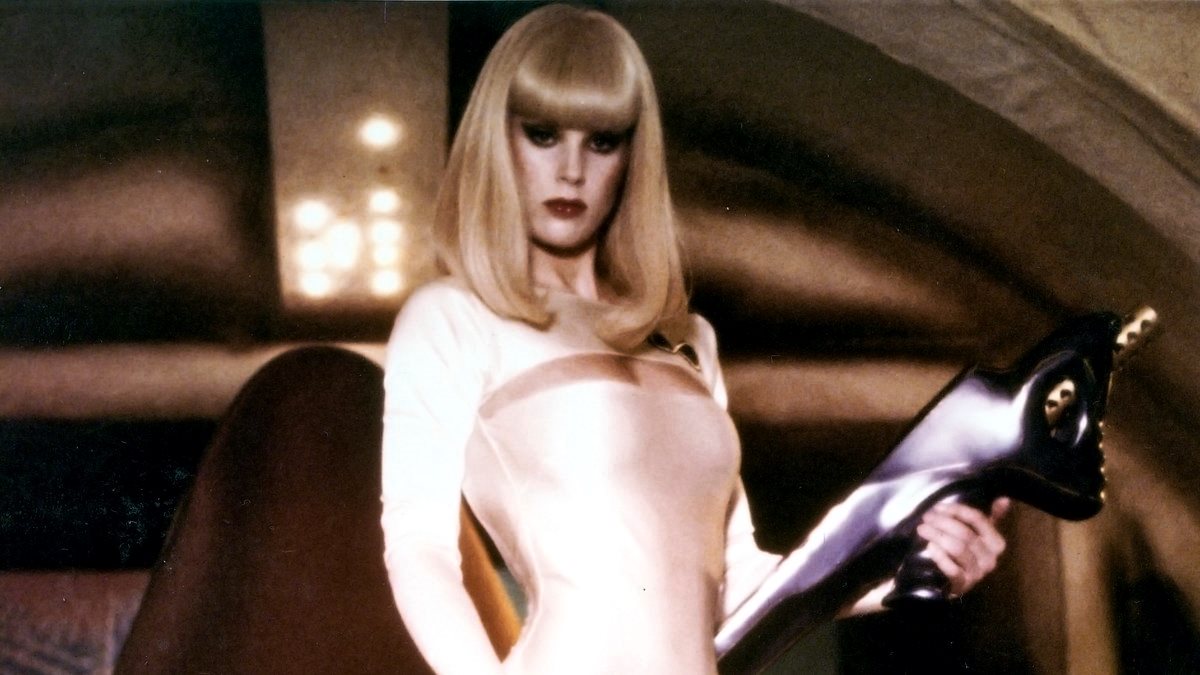Crew
Director/Screenplay – William Sachs, Producer – Marilyn J. Tenser, Photography – Dean Cundey, Visual Effects – Visual Concepts Engineering (Supervisor – Peter Kuran), Photographic Effects Supervisor – Chuck Colwell, Additional Miniature Effects – John Buechler, Makeup – Christopher J. Walas, Production Design – Thomas Turlley. Production Company – Marimark.
Cast
Stephen Macht (Sergeant Thor), Dorothy R. Stratten (Galaxina), Avery Schreiber (Captain Cornelius Butt), James David Hinton (Private Robert ‘Buzz’ McHenry), Lionel Smith (Maurice), Tad Horino (Sam Wo), Ronald Knight (Ordric the Mordric), Percy Rodrigues (Voice of Ordric)
Plot
It is the year 3008. Aboard the United Intergalactic Federation police ship Infinity, Sergeant Thor is attracted to the shipboard android Galaxina, even though she cannot speak and there are only sparks when they kiss. They are ordered on a mission to the planet Alta to obtain the rare Blue Star mineral. The crew settle into cryo-sleep for the 27-year journey, leaving Galaxina to tend the ship. Intrigued by Thor’s attentions, she reprograms herself and teaches herself to talk to be ready for him when he wakes up.
Galaxina was one of the four films that Playboy Playmate Dorothy Stratten appeared in – alongside Skatetown USA (1979), Autumn Born (1979) and They All Laughed (1981) – before she was murdered in 1980 by her jealous boyfriend Paul Snider. There is something in the Dorothy Stratten story, the girl next door who might have become a star, that touches a nerve with the American public and its fascination with Hollywood tragedy stories. There have been three films made about Stratten – Star 80 (1983), the tv movie Death of a Centerfold (1983) and the documentary Dorothy Stratten: The Untold Story (1985).
Galaxina attained notoriety by being released two months before Stratten was murdered. The irony of all of this is that had she not been murdered, Stratten’s career would probably have never amounted to anything more than those of so-called Scream Queens like Monique Gabrielle and Brinke Stevens. Certainly, as Galaxina demonstrates, Stratten displays little discernible talent – she appears as a virtual Barbie Doll, and displays a complete lack of any expression throughout – possibly the reason she has been cast as an android.
Galaxina has its champions but on most counts it is fairly bad. It came in the midst of the post-Star Wars (1977) boom and gives the appearance of people having been given a handful of money and told to go out and make a science-fiction film. It has no real idea what it wants to do, no focus – it just comes across as a collection of half-ideas, some really bad gags and with lots of space shoot-em-ups and ugly mugs thrown in. It has possibly the most boring space battles in cinematic history – two model ships just sit opposite each other and exchange laser fire without moving.

The alien brothel scene is a logical extension of the Star Wars cantina scene but the scene fails through some incredibly cheap and unconvincing alien masks. Avery Schreiber gives a loud, vulgar and intensely annoying performance as the captain. He gets to do a parody of the Alien (1979) chestburster sequence – but the gag is lame and falls flat on its face.
The sense of humour in the film is incredibly dim-witted – an indication is surely the level of pitiful puns that feature on the menus in the Human Cafe – Skin and Tonic, Scotsman on the Rocks, Thigh Pies, Baked Alaskan, Eyesed Cream, Knuckle Sandwich, Poached Legs on Toast and Pot Belly Roast. There are some awful science-fictional parodies of tv commercials – there being an excruciating one about replacing arthritic grandma’s hands with giant atomically-powered pincers.
The film is directed by William Sachs, who made a number of low-budget action films and previously delved into the science-fiction genre with the entertainingly cheesy The Incredible Melting Man (1977) and went onto the children’s haunted house film Spooky House (2002), along with a handful of other non-genre works.


